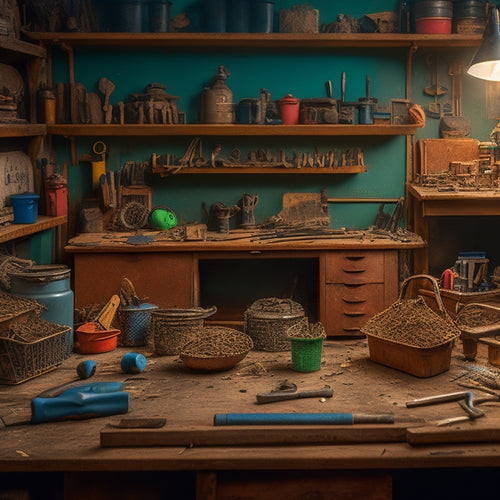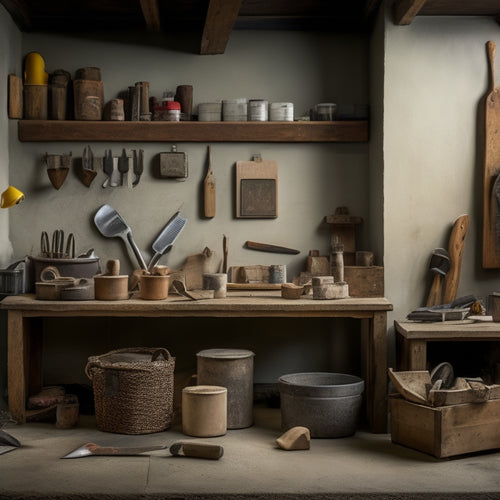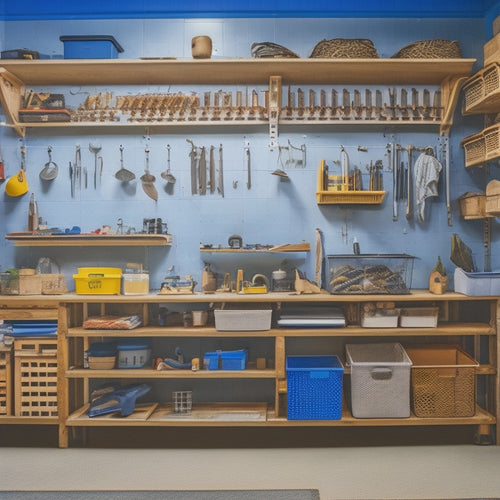
Top 3 Hand Tools for Home Renovation Success
Share
You'll need a solid foundation of hand tools to tackle any home renovation project efficiently and effectively. Among the must-haves, a tape measure is essential for accurate measurements, guaranteeing walls are square and plumb. A level helps achieve horizontal and vertical lines, preventing costly construction mistakes. And, a hammer is a fundamental tool for driving screws without damaging drywall. With these three hand tools, you'll be well-equipped to tackle the majority of renovation tasks. As you move forward, you'll discover how these foundational tools integrate with others to guarantee a successful renovation outcome.
Key Takeaways
• A tape measure is essential for accurate measurements, ensuring walls are square and plumb during home renovation.
• A hammer is a must-have for driving screws, fitting parts together, and breaking apart objects during demolition and construction.
• A utility knife is versatile for cutting various materials, scoring drywall, and scraping old adhesive during renovation tasks.
• Hand tools like screwdrivers, pliers, and wire cutters are necessary for fastening, gripping, and bending materials during renovation.
• Having a level ensures accurate horizontal and vertical lines, preventing costly construction mistakes and ensuring a professional finish.
Essential Tools for Concrete Work
You'll need six crucial tools to tackle concrete work in your home renovation project, each serving a critical function in preparing, mixing, and finishing concrete. These tools will guarantee a safe and successful outcome, so don't skimp on quality or skip any of them.
First, you'll need a reliable concrete mixer to combine and blend the concrete ingredients. A sturdy, high-capacity mixer will save you time and effort.
Next, a finishing trowel is a must-have for smoothing and leveling the freshly poured concrete. Its flat, wide blade allows for even coverage and a professional finish.
Additional important tools include a mixing bucket, a shovel for scooping and pouring, a level for guaranteeing accuracy, a float for smoothing the surface, and an edger for creating clean edges.
Each tool plays a crucial role in achieving a strong, durable, and visually appealing concrete finish. By investing in these six essentials, you'll be well-equipped to handle any concrete task that comes your way, and you'll be able to tackle your home renovation project with confidence.
Top Picks for Wall Construction
Building walls requires precision and accuracy, and having the right tools can make all the difference in achieving a sturdy and visually appealing structure.
When it comes to wall construction, you'll want to focus on tools that excel in framing techniques and drywall installation. A reliable tape measure is essential for accurate measurements, ensuring your walls are square and plumb. A level will help you achieve perfectly horizontal and vertical lines, preventing costly mistakes.
For framing, a circular saw is a must-have for making precise cuts in lumber. Its high-speed blade and adjustable bevel settings allow for smooth, accurate cuts. Additionally, a stud finder will help you locate wall studs quickly and easily, ensuring secure fastening of drywall and finishes.
When it's time for drywall installation, a drywall hammer and joint knife will become your go-to tools. The hammer's specially designed head helps drive screws without damaging the drywall, while the joint knife's curved blade makes quick work of spreading joint compound.
With these top picks in your toolkit, you'll be well on your way to constructing walls that are both strong and visually appealing.
Must-Have Tools for Renovation
Beyond wall construction, an extensive renovation requires a broader range of hand tools to tackle various tasks, from demolition to finishing touches.
You'll need to stock up on tools that can help you with tasks such as measuring, cutting, and fastening. A tape measure, level, and stud finder will guarantee accuracy in your measurements. A utility knife, wire cutters, and pliers will come in handy for demolition and rough-in work. Don't forget to include fastening tools like a hammer, screwdrivers, and a drill in your arsenal.
Proper tool maintenance is essential to extend the life of your tools and guarantee your safety. Regularly inspect and clean your tools, and store them in a dry place.
It's also vital to invest in safety equipment such as gloves, safety glasses, and a first aid kit. Make sure you're wearing the appropriate gear for each task to minimize the risk of injury.
Frequently Asked Questions
What Safety Gear Is Necessary for Home Renovation Projects?
When tackling home renovation projects, you'll need the right safety gear to protect yourself from potential hazards.
As you work with power tools, chemicals, and heavy materials, it's crucial to wear personal protective equipment (PPE).
You should invest in a hard hat, safety glasses, earplugs, and a dust mask to shield yourself from falling objects, debris, and airborne particles.
Don't forget steel-toed boots, gloves, and a first-aid kit to make sure you're prepared for any situation.
Can I Rent Tools Instead of Buying Them for Renovation?
You're contemplating tool rental for your renovation project, and that's a smart move.
Renting tools offers several benefits, including reduced upfront costs and limited storage needs.
When comparing costs, factor in the frequency of use and tool lifespan. If you'll only need a tool for a short period, renting might be the way to go.
Calculate the rental fee versus the purchase price, and don't forget to take into account maintenance and storage expenses.
How Do I Store Tools Safely and Efficiently at Home?
Think of your tool collection as a well-oiled machine, where every piece has its designated spot.
To keep your tools running smoothly, you need a solid storage plan. You'll want to implement tool organization tips like categorizing tools by function, using storage solutions like pegboards and bins, and designating a specific area for each type.
This will help prevent damage, rust, and even theft. By doing so, you'll guarantee your tools are safely stowed away, ready for the next project.
Are Cordless Tools Suitable for Heavy-Duty Renovation Tasks?
When tackling heavy-duty renovation tasks, you're right to wonder if cordless tools are up to the challenge.
The truth is, modern cordless power tools can deliver impressive heavy-duty performance, rivaling their corded counterparts.
With advancements in battery technology, you can expect reliable, consistent power and reduced fatigue.
However, it's essential to choose tools with high-capacity batteries and robust motors to guarantee they can handle demanding tasks safely and efficiently.
Can I Use Old or Second-Hand Tools for Home Renovation?
When considering using old or second-hand tools for home renovation, you'll need to prioritize tool maintenance.
Inspect each tool thoroughly, checking for worn or damaged parts, and perform necessary repairs or replacements.
Additionally, be cautious of tool sourcing, ensuring you're acquiring tools from reputable sellers or donors.
Failing to do so can compromise your safety and the quality of your renovation.
Conclusion
You'll hammer out home renovation success with the right hand tools.
With concrete work, you'll need a trusty hammer, a sturdy trowel, and a reliable level to guarantee a solid foundation.
For wall construction, a TapeTech automatic taper, a DeWalt impact driver, and a Makita recipro saw will get the job done efficiently.
Finally, a set of Klein Tools pliers, a Greenlee wire stripper, and a Bosch rotary hammer will help you tackle any renovation task with confidence.
Related Posts
-

Why Tool Exchange Matters in Home Renovation
You rely on a well-maintained tool belt to complete home renovation projects efficiently, and having access to the ri...
-

3 Beginner-Friendly Tools for Plaster Renovation Success
You'll be glad to know that the three essential tools you need for a successful plaster renovation are the same ones ...
-

7 Best Tool Storage Ideas for Home Renovation
When it comes to home renovation, staying organized is key to maximizing productivity and minimizing wasted time. To ...


